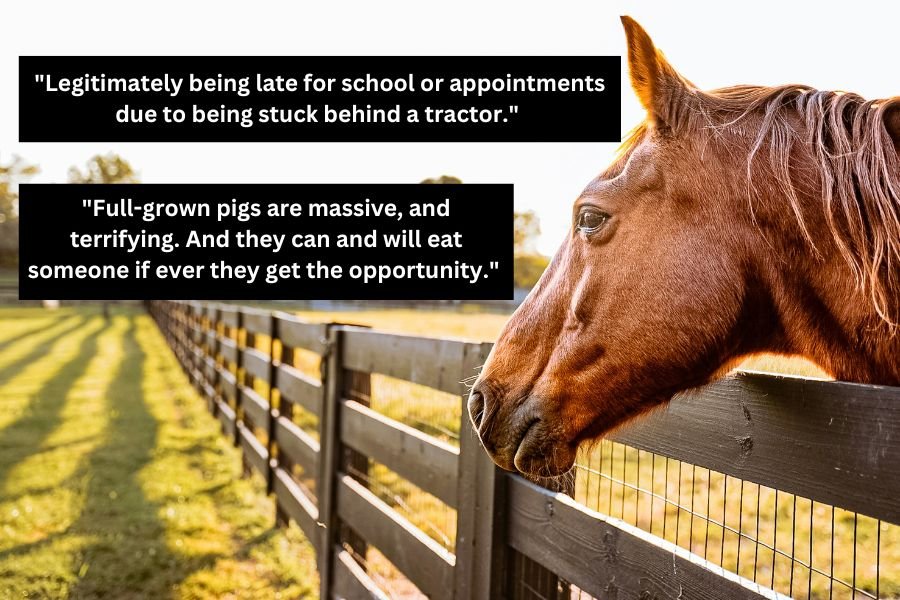If you were to travel around the U.S., you’d see probably note some cultural differences between various regions, from the East Coast to the West Coast, from the South to the Midwest. But what really gives Americans different experiences and perspectives is rural life vs. city life.
Americans have a huge expanse of land we call home, some of which is made up of densely populated cities with intertwining highways and some of which is vast farmland dotted with small towns. Rural and city folks share the most important things in common, of course—the desire to live in peace, the ability to take care of our families, the need for a community we can count on, the appreciation of beauty and nature—but our daily lives can look totally different from one another in sometimes dramatic ways.
Someone on Reddit asked, “Rural folks, what are the things city folks won’t understand?” and the answers are a fascinating peek into life in the country for people who have lived their whole lives in cities. Here are some of the most popular responses:
There may not be traffic, but there are tractors
“Legitimately being late for school or appointments due to being stuck behind a tractor.” – Bimblelina
“I would always leave my house super early when it was planting season and harvest season.” – Sadimal
“We drove our tractors to high school one day per year to celebrate the agriculture that was all around us, wild times.” – TwinTowwa69
“When I was dating my now wife, we were long distance. I grew up in the middle of nowhere Missouri and has several farms around where I lived. One time I was talking to my then girlfriend on the phone and told her ‘Ah crap, I’m stuck behind a tractor. Gonna be a long drive.’
She was silent for a moment before saying ‘….a tractor? What?’ Then it occurred to me that her having grown up in a suburb of Atlanta, had never experienced such a thing.” – paddjo95
Personal wars with the wildlife
“You or someone you know has a personal vendetta against a wild animal in the area.” – NFL_MVP_Kevin_White
“I’ve never seen my father be more creative than when he’s plotting against a racoon that has wronged him.” – reinvent___
“Oh my gosh yes. My dad’s at war with a woodpecker. He’s even printed out an info pamphlet on woodpeckers and wrote in big letters “know thy enemy”. The amount of whirligigs and nets around the house is insane.” – jbird8806
“My uncle was in a war of attrition against beavers for literal decades.” – KMM2404
“Two of my neighbors have a shoot on sight policy for groundhogs. The one who is the most mild mannered was riding down the road on his side by side, and I see him slam the breaks, do a turnabout in a driveway, then heard a gunshot, then he sped off. Saw the groundhog the next morning. The other one, every time I hear a gunshot I wonder ‘snake or groundhog?’” – TacticoolPeter
So many random cows
“I own a house that sits smack in the middle of three cattle farms. The other night, I took my dog out to pee well after dark. There was a weird noise, and a pair of glowing eyes at the end of my driveway. It was, of course, a cow. I called my neighbor to the North. He drove his UTV down, inspected the cow, didn’t recognize it, and called my neighbor to the south. He sent his teenage son over in a car with no catalytic converter/muffler. He also didn’t recognize the cow. Finally, my neighbor from the West was summoned on his ATV. It was his cow. The rest of us stood there drinking beer and watching the Western neighbor drive his cow home with an ATV. Good times.” – EarhornJones
“My neighbor keeps her horses on our farm because we have some pastures already fenced in and the horses keep the grass level. One of the horses, Rose, loves to get out of the pasture and mosey around the farm — more than once she’s walked up to the house and bumped her nose against the window where I’m working inside to say hello. So of course I have to pop outside and pet her and then walk her back. ??♀️ She’s a darling.
Neighbor also has a cow named Star who likes to come up and visit her equine sisters. A bit later, when my neighbor realizes the cow’s missing, I’ll see her trudging up the lane with a lead and then the cow meekly following behind her.” – Elphaba78
“Our cows got out last year for two days and I swear every old man for five miles was stoked to watch for them and help put them back. Word spread like wildfire they were out. Old men were texting on a group text and mounting their atvs and calling my husband. “I seen them on Troy’s place!” It was super helpful and entertaining.” – farmchic5038
So many random vegetables
“Leaving your car windows closed at church in the summer so you don’t come back out to a car full of zucchini” – Armyjeepguy
“There’s no escaping the zucchini. It will be left on the hood, or the roof, or the gardener will straight up accost you after mass and shove a bag of it in to your arms, or trick your children into bringing bags of it out to the car.” – MrsMeredith
“I’m from western Iowa. Instead of zucchini, it’s always sweet corn.” – ProfessorRoyHinkley
“This is exactly the example I use to explain to people the difference between the city and the country. If you live in the country the only reason you lock your doors to your car is the people don’t put vegetables in it. No one believes it’s not a joke.” – Overall_Midnight_
There’s no such thing as a quick run to the grocery store
“You need to carefully plan out your shopping needs because that trip to Walmart or Home Depot might be a two hour round trip.” – lockednchaste
“Moving rural taught me how to cook. I had to build up a well stocked pantry and freezer because the grocery store was an hour away. I had to learn how to plan meals because you needed to know what to thaw out. I learned so many substitutions because sometimes you just didn’t make it to town and the milk, eggs, butter or what have you ran out. All that also got me more comfortable just throwing skillet dinners together because sometimes there just isn’t time for recipes, but I knew what worked well together.
Also, canned and frozen foods. Fresh produce is only good for the first few days after grocery day.” – HplsslyDvtd2Sm1NtU
“I was on the phone with someone one day and realized I forgot milk at the store. They were utterly flabbergasted that i said it was going to have to wait until a few days later to go get because I was not going to do an hour minimum of driving total just to get one item.” – HobbyHoarder_
Pigs are much scarier than you’d think
“Full-grown pigs are massive, and terrifying. And they can and will eat someone if ever they get the opportunity.” – Heroic-Forger
“I’m reminded of my time at the University of Iowa. A fellow I knew, grad student age, but he wasn’t actively attending, walked with a cane because of a gimpy leg. He’d broke it when he was a child, but he’d tell anyone who asked that he was mauled by a sow. He said the city people would just laugh it off as a joke. The country people would look at him in horror and say, ‘And you’re still alive?!?!’” – DrHugh
“Having to explain to my kid why everyone was so scared when Dorothy fell into the pig pen in Wizard of Oz was surreal. I can’t even remember when a healthy fear of swine was instilled into me.” – tikierapokemon
“I’ve worked with wolves, literally had some of them lick my face. I was significantly more uncomfortable being in a pen with a large pig.” – Learningstuff247
Talking about the weather isn’t just trivial small talk
“Weather changes your life. I’ve sat on the porch with my parents watching hail destroy our wheat crop days before it was due for harvest. There’s nothing you can do. You just watch. I’ve also stood in a circle with my parents and older brother in the yard while we prayed for rain. For farmers, weather is destiny.” – Cranialscrewtop
“I took an English lit class in college and we read journal of a woman in the 1860s. Several people were really turned off by how much she wrote about the weather. As the only farm kid in the class I tried to explain to them how much of your life is dictated by the weather. Most of them just stared at me like I was nuts.” – msjammies73
“I’m not a farmer, I am from Nebraska. My relatives who live in a city in another state their whole lives don’t understand why people here talk about the weather so much. It determines the local economy in a lot of ways.” – bubbajones5963
The sweet sound of snowy silence
“Standing on my back porch in winter and there is absolute dead silence.” – vankirk
“The absolute quiet during a heavy snow fall. I went out during one once to take pictures. Got some great shots but the experience of being the only one around is the closest I’ll get to being a pioneer and being the first to see something.” – naughtarneau
“I miss dead silence at night. I grew up with it in a small town, but since college I’ve lived in places with actual civilization. But whenever I’ve brought friends back to my town for a weekend, they’re freaked out by the nighttime silence.” – Petules
“Silent and DARK. I’ve lived in huge cities, suburbs, and back-end-of nowhere unincorporated areas. How dark it gets at night just amazed me in the rural areas.” – Nearby_Reality_5412
“It’s so beautiful. My favorite thing every year is to go for a jog during the first snowfall. No sound but your feet, your breath, and that soft sound of millions of snowflakes landing at once. It’s a bit of peace you just can’t get anywhere outside of a cave.” – xdrakennx
The Reddit thread has more responses, from not flushing the toilet during a power outage to why having multiple guns doesn’t make you a gun nut, that are interesting reads about rural life. And of course, a reverse list could easily be made by city folks for people who have always lived in the country. The better we understand one another’s basic daily experiences, the better we’re able to see through one another’s eyes and understand one another’s perspectives.





























































